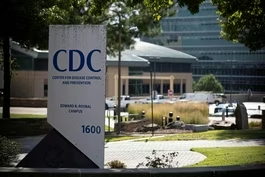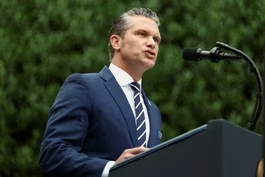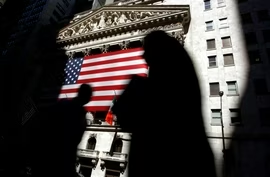
Anthony Kennedy on political civility and the Supreme Court
Clip: 10/14/2025 | 10m 26sVideo has Closed Captions
Former Justice Anthony Kennedy on political division and the state of the Supreme Court
Former Supreme Court Justice Anthony Kennedy served on the nation’s highest court for three decades. He was often described as the swing vote in landmark decisions from marriage equality to campaign finance. It’s a label he’s long resisted, even years after his 2018 retirement. He explained why when he sat down with Geoff Bennett to discuss his new memoir, "Life, Law & Liberty."
Problems playing video? | Closed Captioning Feedback
Problems playing video? | Closed Captioning Feedback
Major corporate funding for the PBS News Hour is provided by BDO, BNSF, Consumer Cellular, American Cruise Lines, and Raymond James. Funding for the PBS NewsHour Weekend is provided by...

Anthony Kennedy on political civility and the Supreme Court
Clip: 10/14/2025 | 10m 26sVideo has Closed Captions
Former Supreme Court Justice Anthony Kennedy served on the nation’s highest court for three decades. He was often described as the swing vote in landmark decisions from marriage equality to campaign finance. It’s a label he’s long resisted, even years after his 2018 retirement. He explained why when he sat down with Geoff Bennett to discuss his new memoir, "Life, Law & Liberty."
Problems playing video? | Closed Captioning Feedback
How to Watch PBS News Hour
PBS News Hour is available to stream on pbs.org and the free PBS App, available on iPhone, Apple TV, Android TV, Android smartphones, Amazon Fire TV, Amazon Fire Tablet, Roku, Samsung Smart TV, and Vizio.
Providing Support for PBS.org
Learn Moreabout PBS online sponsorshipGEOFF BENNETT: Former Supreme Court# Justice Anthony Kennedy served on## the nation's highest court for three# decades and was often described as the## swing vote in landmark decisions from# marriage equality to campaign finance.
It's a label he's long resisted, even# years after his 2018 retirement.
When## we spoke last week about his new memoir,# Life, Law & Liberty," he explained why.
ANTHONY KENNEDY, Former Associate Justice, U.S.# Supreme Court: Well, it's really the metaphor## that's the problem for me.
The metaphor,# you see this person swinging back and forth.
And my comment when people say about that# is that the cases swing.
I don't.
And so## that's why it seems to me -- people can# disagree -- that my jurisprudence is quite## consistent and it doesn't swing.
And so that# was one of the things explained in the book.
GEOFF BENNETT: You were the pivotal voice in# cases that expanded LGBTQ rights, that preserved## abortion rights at the time, but also a ruling# that struck down campaign finance restrictions.
How do you reconcile or explain## those strands of your legal philosophy?
ANTHONY KENNEDY: The campaign finance cases## are very, very difficult.
I'm sure most people# don't like the idea that millionaires, maybe## billionaires, come in and spend all this money in# a place where they don't even live in order to get## somebody elected.
And why should the successful# candidate be the one that has the most money?
That's -- something that's wrong with# it.
So then you're asking me, well,## what are you talking about, Kennedy?
Why did you# write this?
The answer was that what the Congress## had done was to say that corporations could not# give the money.
They forgot that The New York## Times was a corporation, and it was exempt.
The# Washington Post was a corporation.
It was exempt.
And many corporations were small, so the small# Chamber of Commerce, a grocery store.
So to me,## if we had held it for just big corporations, we# would have endless cases on drawing the line,## and we had no jurisprudential reason to do# it.
My suggestion, and it's still my hope,## is that the voters will be better# informed about who is giving money,## who is getting money, and take# that into account when they vote.
And the voters should be better informed.
The# books, it talks generally about we have to be## better informed about how our government works# and what our great -- the issues of our time are.
GEOFF BENNETT: Yes.
We were talking earlie.. your opinions in these key cases.# In the Obergefell v. Hodges case,## you wrote so powerfully about the dignity of# same-sex couples.
And you write in the book## about how someone once told you that the opinion# passed the refrigerator test.
Explain that for us.
ANTHONY KENNEDY: Somebody said, you passed# -- we were at some event.
Somebody said:## "Your opinion passed the refrigerator test."
I said: "What's the refrigerator test?"
If there's something that's written# in a newspaper article or a book or,## in this case, the Supreme Court opinion,# and the parents want the family to read it,## they just get some adhesive tape# and put it on the refrigerator,## and then everybody reads it when they're going# to get something out of the refrigerator.
So certain parts of my opinion, they# said, passed the refrigerator test,## those parts of the opinions which talk about# the dignity and the sanctity of marriage.
GEOFF BENNETT: But Justice Clarence Thomas# recently said at Catholic University that## legal precedents -- this is a# quote -- "are not the gospel."
Given the current petitions# seeking to revisit Obergefell,## do you worry that parts of your legacy,# including that case, could be undone?
ANTHONY KENNEDY: Well, of course,# the law must stand the test of time.## And if we learn or think we learn new things# over the course of years, the judges and the## legal profession and the general public are# free to examine and think about the reasons.
That's why we give reasons for what we do.# That's why we write about what we do and see## if those reasons can stand the test of time.# So the fact that there is a reexamination## and additional conversation, to# me, is a strength of our system.
GEOFF BENNETT: Yes.
I want to ask yo.. warned this past summer in remarks that# freedom and democracy are at risk.
What,## in your view, poses the greatest# threat to our democratic system?
ANTHONY KENNEDY: Lack of civility.
Aristotle wrote that democracy depends upon# a rational, thoughtful, probing discussion in## which you have disagreements, but you respect the# other person, and you do not -- and you respect## the dignity of the other person.
Those with whom# you disagree have a dignity that you must respect.
And in this age of the cyber age, we have# some problems.
Initially, my thought was,## oh, the cyber age is good because we will# all -- more people will talk to each other.## And I don't know.
There are# 39,000 books in the Library## of Congress.
There are close to two# billion Web sites on the Internet.
And the problem with the# Internet, as a professor from the# University of Michigan,# Barbara Meekam (ph), wrote,## is that, sure, we talk to each other more,# but we talk only to people who feel exactly## the same way as we do.
We don't have -- the# Internet doesn't lend itself to a debate.
If you and I are going out to lunch, we# will find something we disagree with and## we will enjoy the lunch, but we disagree.# That doesn't happen on the Internet.
GEOFF BENNETT: Beyond that, is the court# doing enough to safeguard our democratic## system?
There are those who argue that# the court, with its current trajectory,## is strengthening the executive branch at the# expense of Congress, at the expense of the people.
Is that, in your view, a fair assessment?
ANTHONY KENNEDY: Well, my practice# is not to comment on current issues.
We have -- when I -- during my time on# the court, we had three times as many## cases as they have now.
Does that mean# that we were three times as busy?
No,## because of all of these emergency orders.# And the problem with emergency orders is## that there is little time to have briefs# or argument to think, to think about it.
And the court, in my view, is beginning# to recognize that and beginning to say## there will be an executive order.
Sure,# we will allow it for a couple months,## or we won't allow it for a couple months, but# we will hear arguments and then we will decide.
It's very, very important that the court hear# arguments.
One of the problems that we have is,## as you know, lawyers are brilliant now# about finding a way for almost any social## issue to become part of a lawsuit, so that# courts can decide almost any social issue.
This means that we have to be very, very# careful about the authority and the position## of the courts in deciding so many critical# issues that the public should be deciding## for themselves.
Nino Scalia would say, oh,# you ask what the framers of the Constitution## would do, and if they don't give you the# answer, then you can't come up with it.
And many of us disagree with that.
But it is# quite true that we have to be very careful## that we don't just jump off from what the# framers said and decide whatever we like.
GEOFF BENNETT: On that point, as of last week, the# court had issued 23 rulings in a row for the Trump## administration.
At a time when public opinion# of the Supreme Court is near historic lows,## do you worry that the consistent support# for the Trump administration feeds into## this public perception that the court is# partisan or, worse than that, political?
ANTHONY KENNEDY: The danger of the court# being thought of as partisan and political,## it's very real and of great concern to me.
It begins with the confirmation process.# The confirmation process is too partisan.## There are very few presidents who appointed# justices from a different party.
Eisenhower did## Brennan.
And you could argue about Warren.# Warren was something of an independent.
And so partisanship has always played# a role, but it shouldn't dominate.
We## should talk about temperament and learning# and moderation and thoughtful writing.## We should emphasize that more than# just he or she will decide this my way,## and therefore we're going to appoint# that person as a judge.
That's not right.
GEOFF BENNETT: You have shaped the law in# ways that have touched millions of lives,## expanding rights, defining liberty, at times# dividing the nation with some of the rulings.
When you reflect on that, what part of# your legacy feels most meaningful to you?
ANTHONY KENNEDY: Well, I will# think of this answer later tonight.
(LAUGHTER) ANTHONY KENNEDY: The par.. essential for all of government, for all# thoughtful people to give reasons for what we do## and to be unafraid to discuss those reasons openly# and with an open -- and with a searching mind-set.
GEOFF BENNETT: The book is# "Life, Law & Liberty: A Memoir."
Justice Anthony Kennedy, thanks again for# being here.
A real pleasure to speak with you.
ANTHONY KENNEDY: Thank you so much.
It's my## pleasure and honor to be on this# great, great televisio..
Finding remains of hostages will be challenge, analyst says
Video has Closed Captions
Clip: 10/14/2025 | 4m 51s | Finding remains of hostages in Gaza will be 'immense challenge,' Mideast analyst says (4m 51s)
Freed Israeli hostages face long road to recovery
Video has Closed Captions
Clip: 10/14/2025 | 6m 52s | Freed Israeli hostages face long road to physical and mental recovery (6m 52s)
How the latest federal layoffs could impact public health
Video has Closed Captions
Clip: 10/14/2025 | 6m 3s | How the latest round of federal layoffs could impact public health (6m 3s)
Why news outlets rejected the Pentagon's new press rules
Video has Closed Captions
Clip: 10/14/2025 | 8m 23s | Why news organizations are rejecting the Pentagon’s new press rules (8m 23s)
Why the wealthy are thriving as most Americans fall behind
Video has Closed Captions
Clip: 10/14/2025 | 9m 36s | K-shaped economy: Why the wealthy are thriving as most Americans fall behind (9m 36s)
Providing Support for PBS.org
Learn Moreabout PBS online sponsorship
- News and Public Affairs

FRONTLINE is investigative journalism that questions, explains and changes our world.

- News and Public Affairs

Amanpour and Company features conversations with leaders and decision makers.












Support for PBS provided by:
Major corporate funding for the PBS News Hour is provided by BDO, BNSF, Consumer Cellular, American Cruise Lines, and Raymond James. Funding for the PBS NewsHour Weekend is provided by...




